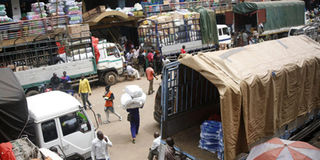58 million fake goods blocked from entering Uganda - report

UNBS has been conducting a number of raids leading to confiscation of fake goods such as mattresses and toilet paper. FILE PHOTO
What you need to know:
- In June, UNBS took up destination inspection for cars after Parliament blocked the renewal of car inspection contractors - Jabal Kilimanjaro Auto Mech, Eat Africa Automobile and Japan Export Vehicle Inspection Centre - pending completion of investigation into their operations.
- Worst record. At 31.9 million imports, 2017 returned more blocked goods than any other year since 2013.
Kampala. Uganda has blocked 58.6 million imports since 2013 on account of non-conformity to standards.
According to data from Uganda National Bureau of Statistics (UNBS), government through the Pre-export Verification of Conformity (PVoC) programme, has blocked millions of goods from entering Uganda because they are below required standards.
Of the 58.6 million, 4.4 million were recorded in 2013, 3.4 million in 2014, 1.2 million in 2015, 17.4 million in 2016 and 31.9 million in 2017.
Ironically since 2015, Uganda has seen an increase in the entry of substandard or fake goods, especially from China and India.
The upward trajectory, according to Mr Godwin Muhwezi, the UNBS communications manager, is because of increased vigilance in regard to compliance programmes.
“The number of blocked goods is an indicator that traders are now complying with the programme [PVoC]. At the introduction, there was resistance which they have since overcome,” he said.
In addition, he said, UNBS has also increased the type of goods eligible for inspection under PVoC to include textiles. Electronics, cosmetics, food stuffs and toilet papers are the most blocked goods.
PVoC was introduced in 2013 to allow inspection of imports from country of origin. Three companies - Bureau Veritas, SGS and Intertek - have been undertaking the inspection.
China, according to UNBS, is the leading source of blocked goods followed by India, UAE, South Africa and Thailand.
According to Mr Charles Ocici, the Enterprise Uganda executive director, PVoC cannot entirely eliminate the entry of fake good, which calls for concerted efforts from both government and the private sector players.
The programme, he said, covers a narrow scope yet Uganda imports goods from a number of countries.
PVoC has also met resistance as traders prefer destination inspection (inspection of goods by UNBS at the borders of Uganda) and not point of origin. However, destination inspection continues to be a challenge to government given the existence of porous borders and insufficient capacity to inspect goods at the borders.
In June, UNBS took up destination inspection for cars after Parliament blocked the renewal of car inspection contractors - Jabal Kilimanjaro Auto Mech, Eat Africa Automobile and Japan Export Vehicle Inspection Centre - pending completion of investigation into their operations.
UNBS, according to Mr Muhwezi, currently inspects 3,000 cars per month, which stretches its capacity.
“We currently have about eight staff handling car inspection in about 35 bonds. This often results in delays in clearance,” he said.
Certification
A recent UNBS report indicated that 54 per cent of goods in Uganda are substandard. The percentage, according to UNBS mainly comprises of locally manufactured products.
To curb this variance, UNBS in July announced a mandatory certification programme for all products on the market before December. Since July, UNBS has registered 200 businesses, which mainly deal in beverages, cosmetics, food stuffs and confectioneries.
These are currently undergoing training and technical assistance on how to produce products that meet standards.




